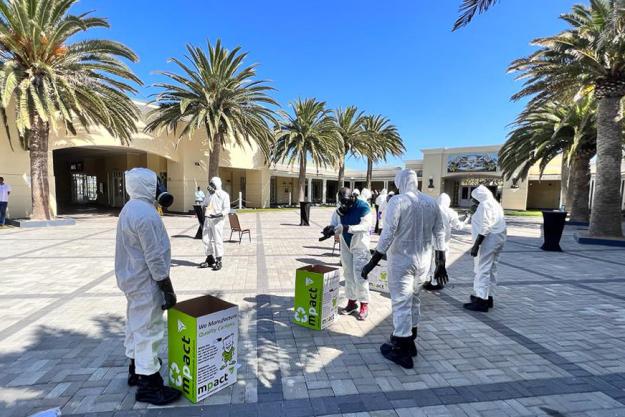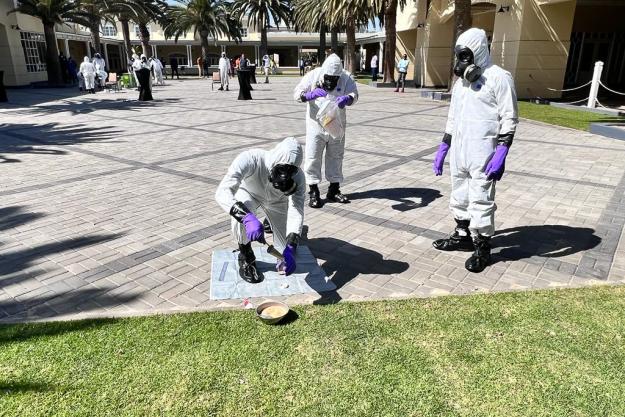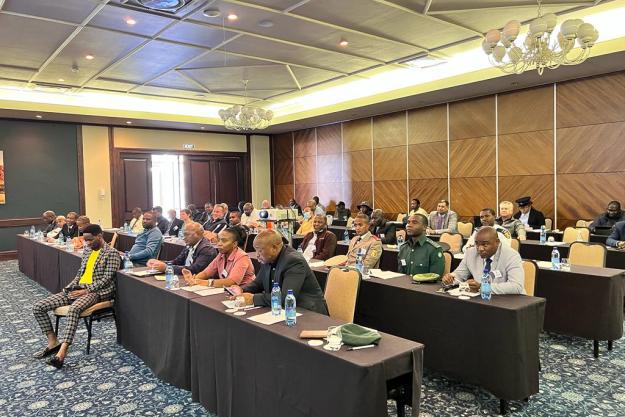In the aftermath of a chemical weapons attack or an incident involving toxic chemicals, it is essential for first responders to have the knowledge, skills and abilities necessary to respond to the emergency.
To support the development of this capability, the Organisation for the Prohibition of Chemical Weapons (OPCW) and the Government of the Republic of Namibia co-organised a training course in Swakopmund, Namibia, for first responders in the Southern Africa Development Community (SADC). The training took place from 9 to 13 May, with financial support from the European Union.
The course was designed to help first responders expand their emergency response and protection capabilities against chemical warfare agents and toxic chemical incidents. Delivered by OPCW experts and a team of instructors from Kenya, Mauritius and Uganda through OPCW's instructor exchange programme, the course covered the use of individual and collective protective equipment as well as monitoring, detection, and decontamination equipment and techniques. Experts also provided instruction on how to conduct sampling and analysis in contaminated areas.

In her opening remarks, Honourable Lucia Iipumbu, Minister of Industrialisation and Trade of Namibia, emphasised her country's commitment to the implementation of the Chemical Weapons Convention (CWC). She welcomed the knowledge and skills gained, noting that it is important to conduct trainings regularly to strengthen national and regional preparedness.
The OPCW Programme Officer responsible for coordinating the course underlined the importance of building reliable national and regional capacities to protect citizens during chemical emergencies. He stressed that the timely and efficient response to these incidents cannot be underestimated and the skills and knowledge acquired are essential to boosting regional capacity.
The training was attended in person by 44 representatives from 14 OPCW Member States: Angola, Botswana, Democratic Republic of Congo, Lesotho, Madagascar, Malawi, Mauritius, Mozambique, Namibia, Seychelles, South Africa, Tanzania, Zambia and Zimbabwe.

Background
The OPCW's International Cooperation and Assistance Division assists Member States in realising the protections and benefits of the Chemical Weapons Convention at the domestic level. Since 2007, it has managed the Programme to Strengthen Cooperation with Africa on the Chemical Weapons Convention - more commonly known as the Africa Programme. Now in its 5th phase, Africa Programme responds to the particular needs of African Member States in their endeavour to comprehensively and effectively implement the Chemical Weapons Convention.
OPCW's Assistance and Protection Branch contributes to the efforts of the Africa Programme with targeted projects falling under the remit of Article X, which focuses on, among other things, assisting States Parties in strengthening national programmes for the development and improvement of a protective capacity against chemical weapons.
As the implementing body for the Chemical Weapons Convention, the OPCW, with its 193 Member States, oversees the global endeavour to permanently eliminate chemical weapons. Since the Convention's entry into force in 1997, it is the most successful disarmament treaty eliminating an entire class of weapons of mass destruction.
Over 99% of all declared chemical weapon stockpiles have been destroyed under OPCW verification. For its extensive efforts in eliminating chemical weapons, the OPCW received the 2013 Nobel Peace Prize.







